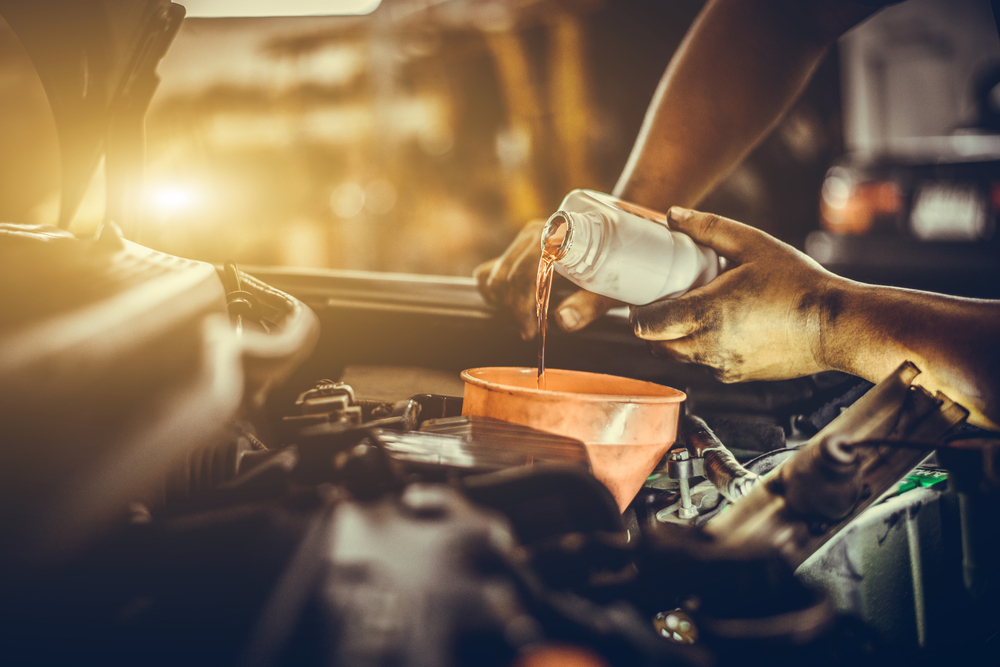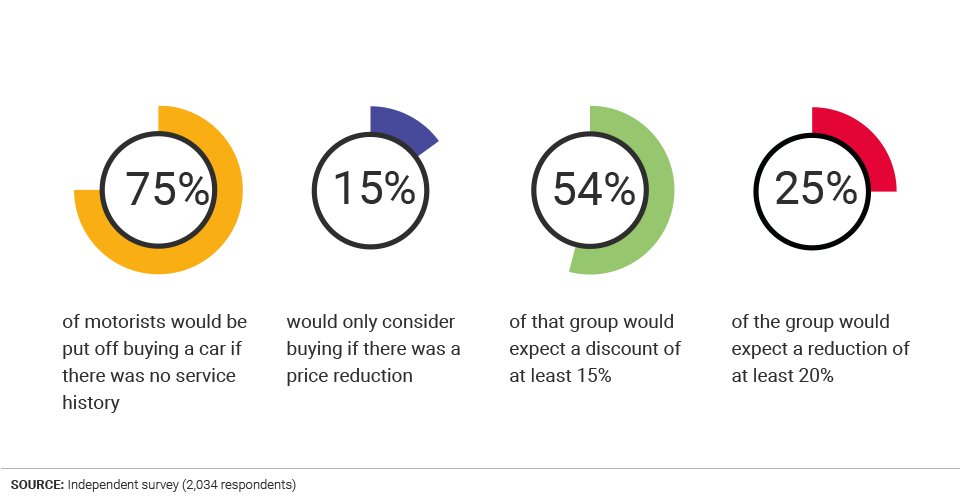The importance of a service history

HPI recently carried out a survey of 2034 drivers, to quiz them about how important a service history is to them when they’re buying a used car. Unsurprisingly, the majority of those asked said that they would feel reassured by the presence of a pile of paperwork to provide evidence of regular maintenance – and they would be prepared to pay a premium for a car that came with a decent maintenance record.
Just one in five of those surveyed said that the lack of a service history would make no difference in their purchasing decision. The remaining 82 percent would either walk away or would expect a significant discount on the purchase price – as much as 20 percent! But just how important is a service history when buying a used car?

What is a service history?
Let’s start by defining what makes a full service history. Is it merely evidence that all routine servicing has been carried out according to the manufacturer’s schedule? That’s a good start, because if not even this basic level of servicing has been performed, there’s little chance of any preventative maintenance having been carried out. But cars need more than just routine servicing – potentially a lot more as the miles notch up.
If you’re buying a high-mileage car, the chances are that it will have had items such as brake discs and pads, shock absorbers, suspension bushes and perhaps the clutch, exhaust or radiator replaced. These repairs will generally fall outside the manufacturer’s servicing schedule because when these parts need to be replaced, it likely won’t be according to mileage or length of time. How and where the car is driven, and whether or not it has been garaged will be more important.
So, a service history is not just a record of the routine maintenance that’s been undertaken, such as an annual oil and filter change. It is proof that items such as the battery, tyres, various light bulbs, and potentially the timing belt if the engine has one fitted, have been replaced. Further, it reinforces that the car has been well kept, and the record of replacement timing reassures a buyer that it is unlikely the car will need service in the immediate future.
However, if you buy a car that comes with an invoice for every penny that has been spent, it is worth reviewing the documentation to ensure all is what it seems. Most cars have a schedule that alternates between minor and major services, though some cars have an intermediate service between these two. The manufacturer will have laid out what has to be replaced in each of these services in the owner’s manual and this is easily checked; over and above these parts there may be others that need to be renewed.
It is not unknown for owners to skimp on their car’s maintenance if they are aiming to sell the car on, so confirm not only that car maintenance has taken place, but also that it has been maintained according to the manufacturer’s schedule. Likewise, confirm that the car has had a major service when it is due, and not just a minor; the former usually entails replacing significantly more parts and, as a result, it is correspondingly more expensive. It may sound like a lot of extra caution and work to go through ahead of buying but only you can decide whether you would rather just take a chance and hope that the car will be a sound purchase.
Franchised or independent?
Where a car is serviced can also make a difference to its value at resale time. Modern cars are very complicated and require specialist equipment and knowledge for accurate maintenance. While many routine servicing jobs such as renewing fluids and replacing filters or fitting new brake discs and pads can be carried out by any competent mechanic, several other repair types are not as straightforward.
An increasing number of replacement parts have to be programmed into the car to work properly, and that takes specialist diagnostic equipment. By law, that equipment has to be made available to independent garages but as the cost is often prohibitive, many are unable to invest in it. Indeed, this equipment can be so costly that only marque specialists can justify the expense – a garage that works on multiple car types can’t invest in the necessary kits for dozens of brands.
While a general garage can be a good bet for routine maintenance, when something that is more specific to car type and model, it should probably be performed by someone who specialises in the marquee service. If you’re buying an Audi, Porsche or Jaguar, for example, a garage that focuses exclusively on these car types will provide reassurance.
Even if a car is still within warranty it doesn’t have to be maintained by a franchised dealer, but to ensure the warranty is not voided the service schedule must be adhered to and original-quality parts must be fitted. Just bear in mind that once a car is outside warranty, if something goes wrong its manufacturer is much more likely to contribute to the repair costs if the car has stayed within the official dealer network for all maintenance.
Staying within the official network has another benefit, too: in most cases all maintenance will be logged on the manufacturer’s computer network so the service history can be retrieved at any point by any dealer. When you consider that it is not hard to forge a service book or to get a replacement, an official online record of all car maintenance can provide great reassurance to the next owner.
Conclusion
There are two key things to focus on when buying a used car, in terms of its service history. The first is whether or not the car has been properly maintained and the other is what the car is worth; its value will be related to how much proof of expenditure has been completed. Ask 50 different people (private and trade) what difference a lack of service history makes to a car’s value and you’ll get 50 different answers.
While a service history is a good indicator of the potential value of a used car, it is one of multiple factors to consider. There are numerous other checks that you can – and should – make. These are detailed in our complete guide to buying a used car, at the heart of which is investing in an HPI Check.
You can build a digital service history and add value to your own car with the free myHPI app (available to use on iOS or in your web browser).
Richard Dredge
November 2019



